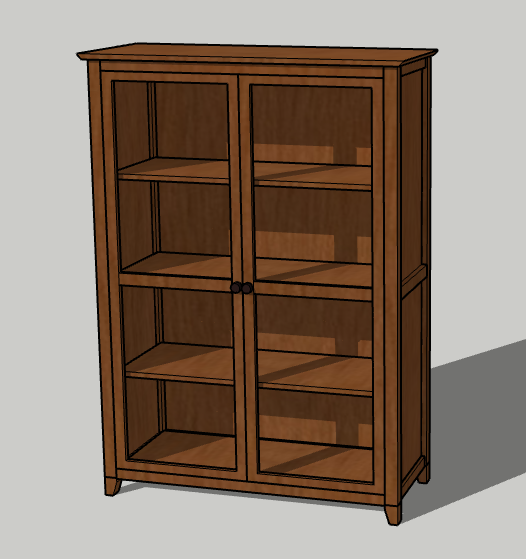Custom Designed Display Cabinet
I have a problem. There is too much work, too many projects, and I can never finish the list. It’s a good problem to have, but I have one project I have been itching to start for over a year now, a display cabinet. I am not sold on the name so I’ll call it a display cabinet for now. Before I talk about the cabinet’s design, let me tell you about a piano. Weird I know, but trust me it’s worth hearing my story to connect the dots.
In my living room sits a baby grand piano. It came to us from my wife’s aunt Kathy. Kathy lives in California and had this piano in storage because she unfortunately did not have room for it in her home. When my wife and I bought our current home her family knew Ashley played piano and that we did not currently have one so Kathy graciously gifted us this beautiful baby grand. But it wasn’t just a piano, this was Ashley’s grandfather’s piano.
I don’t know much about Grandpa Roy, he passed away when Ashley was little and I never had the privilege's of meeting him. I do know he and I would have gotten along. Roy was an engineer and a tinkerer at heart. He always had projects going on in his workshop which was brimming with tools and workbenches to support his many passions such as trains, guns, and most importantly for this story, music. Roy loved music, especially keyed instruments such as his piano and his famous organ he built in his house. Yes, an organ. It was loud, but all of the neighbors loved to come watch and listen to Roy play.
Our piano. I’m not entirely sure what the wood is, could be beech stained walnut. You can’t see it in this picture, but a future project for me will be to refinish the top. After years of California sun it has alligatored to a texture similar to the black scroll boxes.
I love the history and am honored to have Roy’s piano. This particular piano is a Knabe, whom are still in business today. The piano was built in Baltimore in the 1920s, which puts it right around 100 years old. As you can imagine, a piano that old needs some TLC from time to time, and more-so in this case because our piano is a player. If you aren’t familiar, a player piano uses a mechanical system that pumps air through tubes which read a perforated paper scroll that tells the keys to play a song. It’s a pretty amazing 100 year old analog computer.
Unfortunately, when we got the piano the player did not work. So we had it repaired to get the player back in working order which required new tubes and wires and doodads along with normal piano things like new strings and a general tuning.
A scroll box. We currently keep these in drawers in our coffee table.
A scroll loaded into the player drawer. They are showing their age as evidenced by the tear on the right side.
After the repair work and tune up this piano really does sing. I love looking at it just as much as I love listening to it, and I want to protect and show off the antique boxes scrolls, some equal in age to the piano itself. The problem is, we have kids... little kids… 2 and 3 at the writing of this article. As it turns out, antique 100-year-old paper scrolls and two toddlers don’t mix. You can’t just head to Walmart to buy a replacement scroll when a kid decides it would be fun to practice their coloring on these cool looking papers and tear them to shreds in the process.
So I’ve had a display cabinet on my list to accomplish two things: secure the scrolls in a safe place, out of reach of the children and show these beautiful old scrolls off behind glass doors.
When I say I haven’t started this project, that’s a little bit of a lie. I did start by designing the cabinet in Sketchup, a tool I’m still learning how to use. This was actually the first thing I ever designed in a 3D modeling software.
The piano roll cabinet. I know I have been calling them scrolls but we usually refer to them as rolls, but scroll gives you a better picture of what they really look like.
I already built an end table for our living room, the Calvert square end table, and I know I want this piece to match. I also wanted to match the dark finish on the piano to make it look like the furniture in our living room was picked intentionally. Therefore, I chose walnut for the end table and will also use walnut for this cabinet.
I designed it to fit a specific space in the room, across from the piano in a corner under a sconce. It couldn’t be too tall because of the sconce and couldn’t be too big to interfere with the entry into the room.
Given those constraints, I designed the rest based on how I wanted it to look. It will have exposed full length legs in each corner running top to bottom. The doors will be inset with four different glass panels and a separator in the middle to give the doors a little extra strength where the handles will land. The sides will have trim to wrap the divider in the glass doors around the cabinet. The top will have an under bevel to match the end table and the future coffee table I have designed.
Fairly simple. A free standing cabinet with nice clean lines and shelves to display some of our precious items. I hope to have it finished in 2022, but I said I’d start it 4 months ago, so we’ll see.





